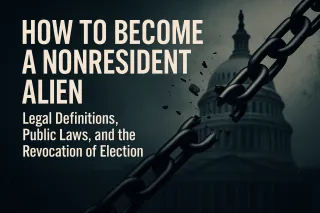Pay No More Tax
Partners With

Register Below to save on federal income taxes

CEO and Founder of Unincorporated Associations
Hello, I'm Kirk!
Kirk Carmichael is the CEO and Founder of Unincorporated Associations and a visionary leader with a heart for people and a passion for teaching the truth about taxes. In 1999, he launched a transportation company that grew to over $40 million in annual sales. A decade later, in September 2009, he discovered how the U.S. tax system truly operates and the limited scope of who it applies to. By restructuring his corporate framework into an Unincorporated Association, Kirk has successfully operated with zero tax liability since 2009.
Known for his patience, clarity, and ability to create effective systems, Kirk dedicates his work to empowering others with the same knowledge and tools. His willingness to share openly, paired with his leadership, continues to inspire people to step into truth and freedom.
Join our Daily 10AM (PST) Q&A Call.
Hello, I'm Albert!
Albert Thomas brings over 35 years of experience in relationship marketing, building lasting connections through trust and attention to detail. Passionate about helping others succeed, he combines expertise with a people-first approach to deliver excellence. Beyond business, Albert is also the singer and songwriter of the original songs below that reflect his creativity, vision, and commitment to inspiring others.

CEO and Founder of
Pay No More Tax
Hello, I'm Jason!
Jason Jehorek brings over 30 years of expertise, specializing in project management, guiding teams and streamlining complex systems. Known for his ability to work through challenges and refine processes, he ensures efficiency and success in every project.

CTO and Founder of
Pay No More Tax
Pay No More Tax Songs
About Us
At the heart of our work is a shared belief: people deserve the freedom to see clearly, live empowered, and walk in truth. With decades of combined experience in relationship marketing, project leadership, and teaching, we have each walked different paths — but those paths have brought us together with one purpose.
We’ve built more than a partnership; we’ve built a family of trust and collaboration. Each of us brings unique strengths — the patience to simplify what seems overwhelming, the precision to refine systems that truly work, and the care to ensure every detail matters. Together, those strengths form a whole far greater than the sum of its parts.
Our mission is simple yet powerful: to shine light where confusion once reigned, to offer tools where there once were obstacles, and to walk beside those ready to step off the wide road of illusion and onto the narrow way of truth. We believe that when people are equipped, empowered, and encouraged, they can rise above systems designed to hold them down — and live free.
When you order your UNA with us, you get:
All the documents you need for UNA & ROE — provided.
Your UNA in as little as 1 day!
1 on 1 Setup Support!
Lifetime Support!
Online Member Community
UNA Training once per week!
What is a private Unincorporated Association?
A private Unincorporated Association is a Secretary of State registered entity offering a more convenient, flexible, and cost-effective way to manage assets and transactions. Unlike corporations and LLCs, this association is private and not available to the public, giving you the privacy and control you desire.
Tax Exempt EIN Number: EIN Number assigned with 575-E status.
Complete Control Over Membership: As a member, you have the final say over all transactions and activities.
Privacy: Your association is not publicly listed, ensuring your complete privacy.
Asset Management: Assign ownership of property (vehicle, house, bank account, etc) to the association to limit/eliminate personal liability.
Easy Transfer of Assets: Sale or transfer of assets is made simple via membership resignation and reassignment as opposed to subjecting the asset to taxes and fees of selling the asset.
Minimal Ongoing Costs: Lifetime registration with no annual fees (vs Corp. & LLC’s are $800 per year)
Proof
That YOU do not have to
PAY FEDERAL INCOME TAX
Joe Banister IRS Agent Updates the Scam & Fukishima the Truth
Fmr. IRS Agent REVEALS "I haven't PAID income taxes in 25 years" it's UNCONSTITUTIONAL | Redacted
The IRS Is A FRAUD
Joseph Banister
EX-IRS CRIMINAL INVESTIGATIVE DIVISION EMPLOYEE TESTIMONIES
G. EDWARD GRIFFIN ~ AUTHOR OF CREATURE FROM JECKYL ISLAND
IRS Whistleblower to Financial Empowerment: Dr. Sherry Peel Jackson's Journey
TWO "UNITED STATES" DISTINCT JURISDICTIONS
EVERYTHING IN COMMERCE IS A FICTION ~ YOUR SOCIAL SECURITY NUMBER
Your Social Security number is the Franchise of the UNITED STATES
The Biggest Scam In The History Of Mankind - Hidden Secrets of Money
Read Our FAQ's
Q. What is an UNA?
ANSWER: An Unincorporated Nonprofit Association (UNA) is a legal structure recognized under U.S. law where two or more people join together for a common nonprofit purpose but do not formally incorporate as a nonprofit corporation.
Q. What type of assets can you place under the UNA?
A UNA can legally hold real estate, money, property, equipment, contracts, and intellectual property in its own name. This is one of the biggest advantages of formalizing even a simple group under the UNA framework.
Q. Who does the Federal Income tax apply to?
ANSWER:The Federal income tax came into being with the approval of the 16th Amendment on February 3, 1913. It’s called a Federal income tax because it is a tax on the Federal government and not the American citizens. The tax only applies to residents of Washington DC and Federal employees. The reason why most people owe the tax is not because of the tax itself but because they sign yearly contract with the IRS agreeing to owe the tax.
Q. When the Federal income tax was passed through Congress in 1913, did Americans know that this tax did not apply to them?
ANSWER: Most certainly! It was a common understanding that the day the 16th Amendment was passed on February 3, 1913 that the tax did not apply to anybody that resided in the 50 states (there were 48 states in 1913 at the time).
Q. I heard that taxes are voluntary? Am I protected from paying a tax to the Federal government?
ANSWER: The US Constitution of 1789 still is in effect today. In Article 1, Section 9, Clause 4 of our Constitution exists a protection against a Federal tax on all American people residing in any State in the Republic. In 1790, there was an agenda to place a National government in a corporate territory of 10 square miles naming it Washington DC. It became a separate jurisdiction other than the Constitutional Republic. So, when the 16th Amendment was passed, a law applying only to residents of Washington DC and Federal employees, it is when people volunteer to sign a contract with the IRS they forfeit their Constitutional right.
Q. What makes taxes mandatory? Why will the IRS send me a letter if I do not file a return?
ANSWER: The IRS will send a letter to you for a given year if a tax return contract is not signed because A) you showed money reported to your social security number that year and B) you fall under their jurisdiction as a “taxpayer” because you established a prior contractual relationship.
Q. Can I remove myself from the IRS’s jurisdiction and revoke my contract with them and can I stop reporting money to my social security number?
ANSWER: You can remove yourself from the IRS jurisdiction by sending them a Revocation of Election affidavit and you can remove reporting to your social security number by forming an Unincorporated Nonprofit Association.
Q. How is the Unincorporated Association tax exempt and not required to file a tax return (contract)?
ANSWER: An Unincorporated Association is not subject to the IRS statutes and codes or the laws of Washington DC. The definition of the word “corporation” means to cooperate. Unincorporated means to not cooperate or not be under the jurisdiction. As it relates to Washington DC the Unincorported Association is not tied to anybody’s social security number which is formed by the government through a birth certificate and lodged in Washington DC.
Q. What does the word “nonprofit” mean?Your Title Here
ANSWER: The IRS uses a different dictionary than you and I use. The IRS defines the word “nonprofit” to appear to be restricted in scope of use but in reality being a nonprofit does not mean it does not make a profit. Being unincorporated it is not subject to the IRS’ statutes and codes and also not restricted to their scope of terminology.
Q. I thought a person that earns an “income” must pay tax?
ANSWER: The IRS uses a different dictionary than you and I use. When the IRS uses the word “income” they are referring to corporate excise tax, not a private civilian earning wages. The “FEDERAL” income tax was a tax levied onto the FEDERAL government and not onto individual American citizens residing in the 50 republic states.
Q. The IRS manual and many Court cases say that a US Citizen is obligated to pay taxes?
ANSWER: The IRS uses a different dictionary than you and I use. When the IRS uses the word “US citizen” they are referring to your social security number, a legislatively created fiction, lodged in Washington DC, not a citizen residing in the 50 states. A citizen living in the 50 states is titled a State Citizen or an American National. The IRS actually has a term for somebody living outside of Washington DC and its a strange term called a “nonresident alien”.
Q. Do Unincorporated Associations have liability?
ANSWER: No, there are no liability for individual members. The are a private member association protected by the organization.
Our Blog

Wizard’s First Rule: The Spell of Control and How to Break It
“People will believe a lie because they want to believe it’s true, or because they are afraid it might be true.” Terry Goodkind’s Wizard’s First Rule is more than fantasy. It’s a mirror held up to hum... ...more
Pay No More Tax ,The Bible as Law
October 25, 2025•7 min read

From Water to Paper: vessels, titles, currency… and the people who power it
Out on open water, vessels carry cargo. A seaman keeps watch; a bill of lading lists what’s aboard. When the ship docks, port officers inspect the papers and value crosses the threshold—from sea to la... ...more
Learn How To Be Tax Free! ,Pay No More Tax &The Bible as Law
September 29, 2025•9 min read

How to Become a Nonresident Alien: Legal Definitions, Public Laws, and the Revocation of Election
The status of a Nonresident Alien (NRA) under U.S. law is one of the most misunderstood but important positions in the realm of taxation and jurisdiction. Many assume it applies only to foreign nation... ...more
Learn How To Be Tax Free! ,Pay No More Tax &How to Become a Nonresident Alien
September 26, 2025•6 min read